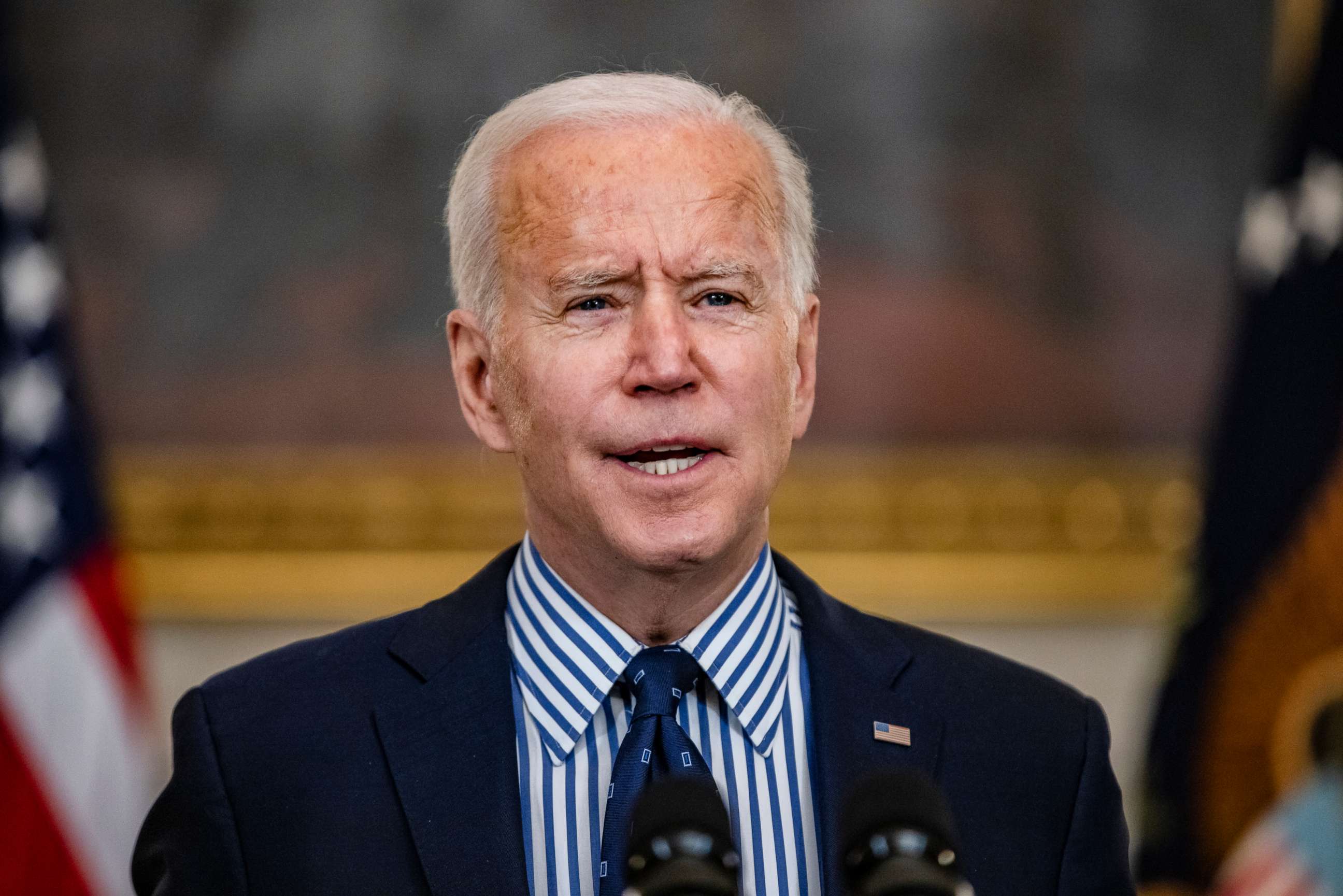Biden's Washington brings Democrats a pricey victory: The Note
The final stages of passing the $1.9T package will be on Democrats to work out.
The TAKE with Rick Klein
What has kept Democrats together in approving President Joe Biden's COVID-19 package is also what has kept Republicans from joining with them.
That leaves Biden and his party owning and now trying to sell an enormously expensive, while also relatively popular, basket of relief measures -- direct payments to more than 150 million households, help with rent and mortgage payments and for the long-term unemployed, and money to states, schools and for vaccine distribution.
It leaves Republicans voicing concerns about the process and the price tag. Both of those reveal truths about Biden's Washington that show Democrats their possibilities as well as their potential limits -- with the seesaw of power between moderates and progressives making both sides a bit wary.
The final stages of passing the $1.9 trillion package in the House will be on Democrats to work out for themselves this week. The fact that they're expected to do just that -- after Senate Democrats and the White House maneuvered the bill to the liking of both Sens. Bernie Sanders and Joe Manchin -- was not inevitable.

It helps to have public backing: Biden enjoys 68% approval for his handling of the pandemic, with 35% support among Republicans, in the latest ABC News/Ipsos poll.
Perhaps more importantly, voters seem to agree with his perspective on the coronavirus, with clear majorities concerned that it's too soon to loosen mask mandates and restrictions on public gatherings.
The urgency of the moment has made it easier for party unity to hold. That, though, has proven true inside both parties.
The RUNDOWN with Averi Harper
Fifty-six years have passed since protesters demanding the right to vote, including the late civil rights icon Rep. John Lewis, were beaten by state troopers on the Edmund Pettus Bridge in Selma, Alabama. To commemorate the horrors of that Bloody Sunday, which galvanized federal lawmakers to pass the Voting Rights Act of 1965, Biden signed an executive order Sunday aimed at expanding access to the ballot box.
The order in itself isn't a sweeping expansion of voting rights, but it's meant to "send a message to all the states and to all voters about the importance of democracy," according to a Biden administration official.
It calls on federal agencies to create plans for wider distribution of voting information, voter registration materials and to modernize Vote.gov. It directs federal officials to identify barriers to voting for people with disabilities and aims to make it easier for federal employees, active-duty military members and other overseas voters to cast their ballots. It also establishes a group of federal officials focused on increasing outreach, registration and turnout in Native American communities.
The executive order is almost as notable, if not more so, for what it doesn't accomplish. It cannot keep state legislatures from suppressing the vote through rollbacks of vote by mail, no-excuse absentee voting, early voting or a host of other potentially discriminatory actions. In turn, the legacy of Lewis and those who crossed the bridge alongside him remains in peril. Since January, more than 250 bills that would restrict voting access have been introduced in 43 state houses, according to the Brennan Center for Justice.

Biden's order comes as H.R. 1, the extensive voting reform package heads to the Senate where it will undoubtedly face challenges from staunch opponents on the right. Biden has called for the passage of the bill along with a restoration of the Voting Rights Act after the Supreme Court struck down provisions that required federal approval for changes to voting in areas that have historically discriminated against voters of color in 2013.
The bill will be another test of the Biden administration's willingness to push past Republican opposition to achieve progressive agenda priorities, but it will also demonstrate how hard Biden is willing to fight to honor Lewis' dying wish. During his virtual address at an event marking Bloody Sunday, Biden reflected on a conversation he had with Lewis just days before his death.
"He asked us to stay focused on the work left undone to heal and to unite this nation around what it means to be an American," said Biden. "That we are all created equal and deserve to be treated equally."
The TIP with Alisa Wiersema
She's not the first Arizona senator to shock fellow lawmakers with a "thumbs down" during a consequential floor vote, but Kyrsten Sinema's move to side with Republicans and a handful of Democrats to oppose an increase to the minimum wage laid the groundwork for a policy theme that will carry through the 2022 elections. With the pandemic looming over virtually every aspect of legislation and future campaign logistics, lawmakers will surely be challenged to justify their positions on an issue that is broadly popular with voters. Already, some 2022 Senate hopefuls in battleground states are rallying around raising the minimum wage as a campaign promise.
Although Sinema is not up for reelection for another four years, her fellow Arizona Democratic colleague Sen. Mark Kelly -- who helped the party gain control of the upper chamber -- will face voters again in the upcoming midterm election. In contrast to Sinema, on Friday, Kelly gave a thumbs up to the amendment to raise the minimum wage. Kelly's vote further highlighted the depth of the intraparty divide over the issue, while also indicating a political gamble aimed at constituents' immediate views.

In a statement following her vote, Sinema said she wants to continue working toward a solution. "No person who works full time should live in poverty ... the Senate should hold an open debate and amendment process on raising the minimum wage, separate from the COVID-focused reconciliation bill," she said.
Manchin, who also voted against the amendment, echoed Sinema's intent to work toward a future deal that would raise the minimum wage in an interview with ABC's "This Week" Co-anchor Martha Raddatz on Sunday. Manchin, who like Sinema is not up for reelection until 2024, suggested the base pay should start at $11 rather than $15. "It shouldn't be a political football," Manchin said.
ONE MORE THING
President Joe Biden retains broad support for his coronavirus response, though the country appears to be wary of aggressively loosening restrictions aimed at curbing the spread of the virus, according to a new ABC News/Ipsos poll.
THE PLAYLIST
ABC News' "Start Here" podcast. Monday morning's episode features ABC News White House correspondent MaryAlice Parks, who examines what's in the Senate-passed stimulus bill as it heads back to the House for final passage. ABC News' Alex Perez tells how Minneapolis is responding to stepped-up security for the trial of former officer Derek Chauvin. And "When Meghan Met Harry" podcast host Kristen Meinzer recaps Prince Harry and Megan Markle's interview with Oprah Winfrey. http://apple.co/2HPocUL
WHAT YOU NEED TO KNOW TODAY
Download the ABC News app and select "The Note" as an item of interest to receive the day's sharpest political analysis.
The Note is a daily ABC News feature that highlights the key political moments of the day ahead. Please check back tomorrow for the latest.




